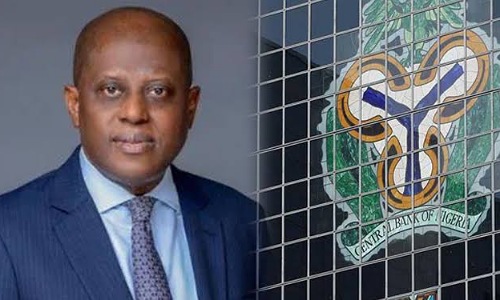Business
Nigeria’s External Reserves Rise 2.83% Amid Foreign Inflows

In a testament to Nigeria’s economic strength, the country’s external reserves have surged by 2.83% year-to-date, propelled by increased foreign capital and remittances.
Recent data from the Central Bank of Nigeria (CBN) reveals a noteworthy uptick, with foreign currency reserves reaching $34.11 billion as of March 7, 2024—up from $33.17 billion at the beginning of the year.
This boost in reserves, comprising foreign currencies, gold, and other international assets, reflects Nigeria’s ability to navigate and thrive amid global economic currents.
Recall that on Wednesday, the CBN unveiled a striking surge in Diaspora remittances.
February witnessed an extraordinary spike, with remittances skyrocketing by an astounding 433%, surging to $1.3 billion compared to the $300 million reported in January.
It said “We saw a 1.0 percent week-on-week (w/w) accretion in the foreign reserves to $34.02bn as of March 6th, 2024, owing to foreign capital inflow (evident in the year-to-date (YTD) foreign net inflows of $822.6m through the NAFEM window) following CBN’s drive to attract FX, analysts at Afrinvest Securities Limited.”
On Friday, the Naira experienced a 1.55% depreciation, with the dollar quoted at N1,627.40, marking a decline from Thursday’s N1,602.17, as reported by the FMDQ Securities Exchange.
The intraday high also weakened to N1,640 per dollar on Friday, compared to N1,635 on Thursday.
However, the intraday low showed improvement, reaching N1,413/$1 on Friday, stronger than Thursday’s N1,470/$1.
Notably, there was a substantial increase in dollar supply, rising by 63.48% to $269.35 million on Friday, up from $164.76 million recorded on Thursday.
In the parallel market, commonly referred to as the black market, the Naira remained stable at N1,620 per dollar.
Governor Olayemi Cardoso of the Central Bank of Nigeria (CBN) announced, following the Monetary Policy Committee (MPC) meeting on February 27, 2024, that the country’s external reserves had increased to $34 billion from the initial $33 billion at the beginning of the year.
Moreover, on February 5, 2024, the CBN reported a reduction in the inherited $7 billion FX backlog to $2.2 billion.
The CBN expressed its commitment to resolving the outstanding balance, demonstrating efforts to address foreign exchange challenges.
According to a weekly report by Afrinvest, the Naira maintained stability across the FX market, trading within a similar band as the preceding week.
The report highlighted a 41.4% improvement in activity at the NAFEM Window, totaling $421.6 million, a notable increase from the previous week’s $473.1 million.
Furthermore, the report indicated a 4.9% week-on-week depreciation of the Naira against the dollar at the NAFEM Window, with the exchange rate falling to N1,627.40/$1.00.
Additionally, the parallel market witnessed a 5.3% week-on-week dip in the Naira against the dollar, settling at N1,600.00/$1.00.
It said “We note that the spread between the NAFEM and parallel rates sustained its streak for the second week though the weekly average declined 98.8 percent to N27.40.
“In the week ahead, the Naira is likely to trade within a similar band across FX segments, supported by intensified regulatory spotlight, the analysts.”
In a press briefing held in Abuja, Hakama Sidi Ali, the acting director of corporate communications at the Central Bank of Nigeria (CBN), underscored a substantial increase in overseas remittances, surpassing four times the figures from the preceding month.
Ali emphasized the heightened interest of foreign investors in Nigerian assets, revealing investments exceeding $1 billion in February alone.
Additionally, she highlighted a positive trajectory in total portfolio flows for 2024, reaching $2.3 billion, showcasing promise compared to the $3.9 billion recorded for the entire previous year.
In addition, Ali highlighted that the momentum of increased foreign exchange inflows continued into March 2024.
This surge was attributed to a heightened investor appetite for short-term sovereign debt following adjustments to benchmark interest rates.
A significant development was observed in government securities issuances, with substantial oversubscription.
Foreign investors took a leading role, contributing to over 75 percent of the total bids received during auctions conducted on March 1 and 6, 2024.
Business
Nigeria Can Achieve 5.5% GDP Growth – NESG
The Nigerian Economic Summit Group (NESG) has projected that the country has the potential to achieve a 5.5% growth in Gross Domestic Product (GDP) if critical policy reforms are sustained.
This was disclosed on Thursday during the launch of the NESG’s 2025 Macroeconomic Outlook report.
Speaking at the event, the Chief Economist and Director of Research & Development at NESG, Dr. Olusegun Omisakin, highlighted the need for more efficient policy implementation to unlock Nigeria’s economic potential.
READ MORE: Davido Is Richer Than His Billionaire Father – Ibrahim Chatta Claims
“We believe at the optimal level, if we embark on more efficient policy reforms, the Nigerian economy has the potential, the GDP to end up at 5.5 per cent, and we believe that this is achievable,” Omisakin stated.
More to follow……….
Business
CBN Approves Release Of Nigerian FX Code
The Central Bank of Nigeria (CBN) has announced the release of the Nigerian Foreign Exchange (FX) Code, a set of guidelines designed to promote ethical conduct among authorized dealers in the country’s FX market.
In a statement, the apex bank disclosed that the official launch of the Code would take place on Tuesday, January 28, 2025, at the CBN Head Office Auditorium in Abuja.
READ MORE: Dangote Denies Culpability In Pumping Up Petrol Price
“The Central Bank of Nigeria has approved the release of the Nigerian Foreign Exchange (FX) Code as a guideline to the banking industry to promote the ethical conduct of authorised dealers in the Nigerian Foreign Exchange Market,” the statement read.
The introduction of the FX Code is expected to enhance transparency, accountability, and professionalism within Nigeria’s foreign exchange ecosystem, aligning it with global best practices.
The event is anticipated to attract key stakeholders in the financial and banking sectors, as well as representatives from authorized FX-dealing institutions across the country.
Business
How Trump Plans To Grow American Economy By $1 Trillion Daily

The 47th President of the United States, Donald Trump attracted up 3 trillion dollars in investments into the country’s economy in his first full day at work.
This was gleaned from the verified handle of the POTUS on micro-blogging site, X, on Wednesday.
Biztellers reports that the POTUS is focused ensuring at least $1 trillion investment daily for the first seven days of his return to the White House, which would be driven by key clearly identified areas, including artificial intelligence.
ALSO READ: WHO Expresses Regret Over US’ Withdrawal
President Trump wrote, “In total, before the end of my first full business day in Washington and the White House, we’ve already secured nearly $3 trillion of new investments in the United States.
“And probably, that’s going to be six or seven by the end of the week.”
In a short video clip accompanying the statement, President Trump assured that the surge in investments would likely hit $7 trillion within his first seven days as the 47th POTUS.
He highlighted that artificial intelligence had proven to be an area lots of willing entrepreneurs had shown much appetite for.












